中考精英总复习人教英语(浙江)第三讲七年级下Unit
- 格式:doc
- 大小:66.00 KB
- 文档页数:6

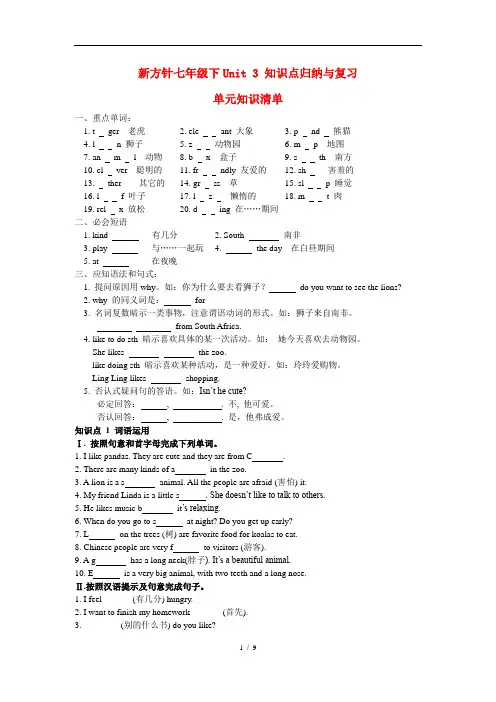
新方针七年级下Unit 3 知识点归纳与复习单元知识清单一、重点单词:1. t ger 老虎2. ele ant 大象3. p nd 熊猫4. l n 狮子5. z 动物园6. m p 地图7. an m l 动物8. b x 盒子9. s th 南方10. cl ver 聪明的11. fr ndly 友爱的12. sh 害羞的13. ther 其它的14. gr ss 草15. sl p 睡觉16. l f 叶子17. l z 懒惰的18. m t 肉19. rel x 放松20. d ing 在……期间二、必会短语1. kind 有几分2. South 南非3. play 与……一起玩4. the day 在白昼期间5. at 在夜晚三、应知语法和句式:1. 提问原因用why。
如:你为什么要去看狮子?do you want to see the lions?2. why 的同义词是:for3. 名词复数暗示一类事物,注意谓语动词的形式。
如:狮子来自南非。
from South Africa.4. like to do sth 暗示喜欢具体的某一次活动。
如:她今天喜欢去动物园。
She likes the zoo.like doing sth 暗示喜欢某种活动,是一种爱好。
如:玲玲爱购物。
Ling Ling likes shopping.5. 否认式疑问句的答语。
如:Isn’t he cute?必定回答:, . 不, 他可爱。
否认回答:, . 是,他弗成爱。
知识点1 词语运用Ⅰ. 按照句意和首字母完成下列单词。
1. I like pandas. They are cute and they are from C .2. There are many kinds of a in the zoo.3. A lion is a s animal. All the people are afraid (害怕) it.4. My friend Linda is a little s . She doesn’t like to talk to others.5. He likes music b it’s relaxing.6. When do you go to s at night? Do you get up early?7. L on the trees (树) are favorite food for koalas to eat.8. Chinese people are very f to visitors (游客).9. A g has a long neck(脖子). It’s a beautiful animal.10. E is a very big animal, with two teeth and a long nose.Ⅱ.按照汉语提示及句意完成句子。
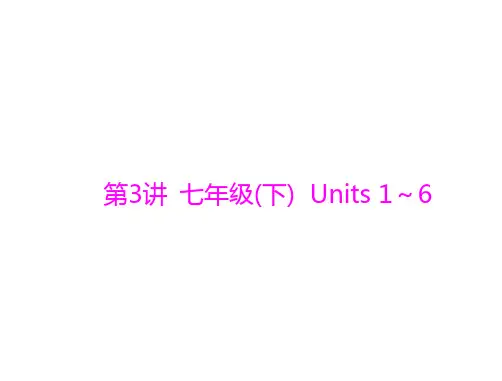
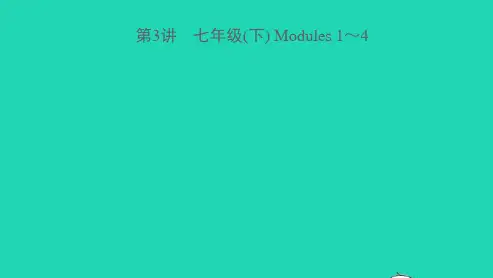
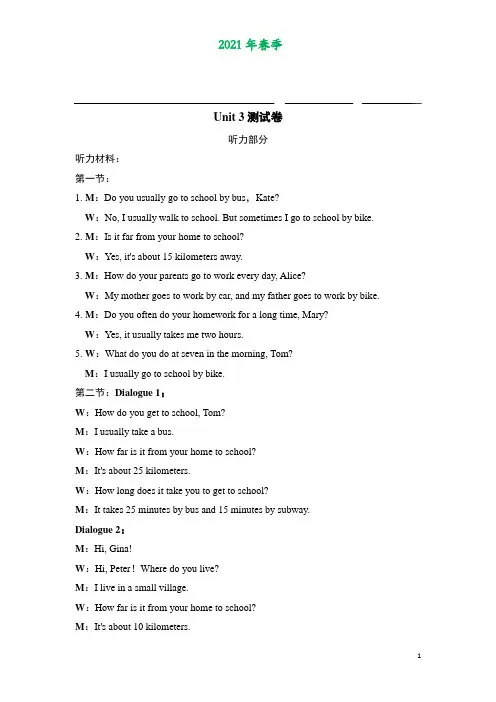
2021Unit 3测试卷听力部分听力材料:第一节:1. M:Do you usually go to school by bus,Kate?W:No, I usually walk to school. But sometimes I go to school by bike.2. M:Is it far from your home to school?W:Yes, it's about 15 kilometers away.3. M:How do your parents go to work every day, Alice?W:My mother goes to work by car, and my father goes to work by bike.4. M:Do you often do your homework for a long time, Mary?W:Yes, it usually takes me two hours.5. W:What do you do at seven in the morning, Tom?M:I usually go to school by bike.第二节:Dialogue 1:W:How do you get to school, Tom?M:I usually take a bus.W:How far is it from your home to school?M:It's about 25 kilometers.W:How long does it take you to get to school?M:It takes 25 minutes by bus and 15 minutes by subway.Dialogue 2:M:Hi, Gina!W:Hi, Peter!Where do you live?M:I live in a small village.W:How far is it from your home to school?M:It's about 10 kilometers.2021W:Do you go to school by subway?M:No, I don't. I take the bus to school.W:When do you leave home?M:I leave my home at 6:50 am. What about you, Gina?W:My home is not far from school, so I always walk to school.M:How long does it take you to get to school?W:About thirty minutes.第三节:Text:M:I'm John. My father is a teacher. He works in a middle school. He teaches P. E. He takes the subway to go to work every day. He usually leaves home at 7:00 a. m. and walks to the subway station. It's interesting on the subway, because he likes to talk with people. He usually gets to school at 7:40. He eats rice and vegetables for lunch at 12:00 at school. At 17:30, he gets home and makes dinner for us. I think my father is a good teacher and he is a good father, too.听力答案:一、1-5:ABCAB6-10:BCABC11-15:CBCBC笔试部分二、16-20:CADBD21-25:ABACD三、A26-28:ADC B29-32:BCBA C33-36:CADBD37. A点拨:细节理解题。

人教版七年级下册英语Unit3知识点(word版可编辑修改)编辑整理:尊敬的读者朋友们:这里是精品文档编辑中心,本文档内容是由我和我的同事精心编辑整理后发布的,发布之前我们对文中内容进行仔细校对,但是难免会有疏漏的地方,但是任然希望(人教版七年级下册英语Unit3知识点(word版可编辑修改))的内容能够给您的工作和学习带来便利。
同时也真诚的希望收到您的建议和反馈,这将是我们进步的源泉,前进的动力。
本文可编辑可修改,如果觉得对您有帮助请收藏以便随时查阅,最后祝您生活愉快业绩进步,以下为人教版七年级下册英语Unit3知识点(word版可编辑修改)的全部内容。
Unit3 名词:train 火车bus 公共汽车subway 地铁bike 自行车car 汽车minute 分钟kilometer 千米river 河village 村庄villager 村民bridge 桥boat 船year 年动词:drive 开车live 居住cross 越过leave 离开形容词:new 新的every 每个afraid 害怕的true 真的介词:by 乘(交通工具)between 介于……之间兼类词:ride v骑n旅程 far adj&adv 远many adj&pron 许多 dream n梦想;睡梦 v做梦短语:every day 每天think of 认为;想起come true 实现;成为现实between……and……在……和……之间1、表示交通方式take the train = by train 乘火车take the bus = by bus 乘公交车take the taxi = by taxi 乘出租车take the plane = by plane 乘飞机take the subway = by subway 乘地铁take a train = drive a car = by car 乘汽车/开汽车ride a bike = by bike 骑自行车2、It is + 形容词 + for sb to do sth 对于某人来说做某事怎么样It is important for us to study hard. 对于我们来说努力学习很重要。

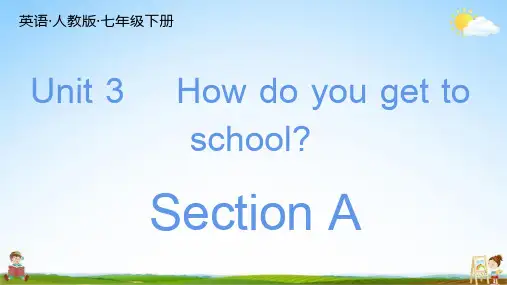
英语·人教版·七年级下册Unit 3 How do you get toschool?Section A一、词汇运用(A)根据汉语或首字母提示写出单词1.Because of the heavy rain,the (地铁)service in Zhengzhou resumed(重新开始)after nearly two months.2.This is a photo of a 5G automatic (公共汽车) outside of the International Exhibition Center in Zhengzhou.3.The (新的)airport(机场)—Beijing Daxing International Airport looks like a phoenix(凤凰).4.[2019贵州铜仁中考改编]My home is so f away from our school that I have to get up early.5.[2021海南中考]There are many old people who are over a h years old in Hainan.1.subway 句意:因为大雨,郑州地铁服务在将近两个月后重新开始。
2.bus 句意:这是一张停在郑州国际会展中心外的5G自动驾驶公共汽车的照片。
bus"公共汽车"。
3.new 句意:这个新机场——北京大兴国际机场看起来像一只凤凰。
4.far 句意:我家离我们学校太远了,所以我不得不早起。
根据句意及首字母提示可知,对应的单词是far。
5.hundred 句意:海南有很多百岁以上的老人。
根据句意及首字母提示可知,应填hundred。
(B)用所给单词的适当形式填空6.[2020湖南永州中考]—How does your English teacher go to school?—She usually (drive) to school.7.I know Wang Jing (live) with her grandparents.8.It’s about 500 (kilometer) from Xi’an to Zhengzhou.9.—How long does it take you to get to Tianjin?—About 20 (minute) by car.10.It’s believed that riding (bike) is good for our health and the environment(环境).6.drives 根据题干中的does以及usually可知,此处表示的是一般情况,应用一般现在时;主语为She,故填drives。
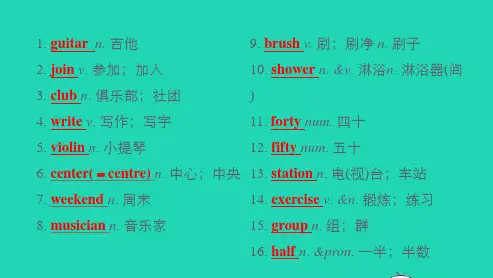
考点集训3七年级下册Units 1-6一、完形填空。
(2014,泸州)Anna and I are good friends since we were children.When she was young,her family was very __1__.So she often helped me.But two years ago,her family got into __2__ because of a terrible accident.They had no money.Anna was very __3__.To cheer her up,I always try my best to __4__ her.One day she said she was inviting me to have lunch.On the way,I began to worry:she had no money,__5__ if I offered to __6__,I would hurt her.When we arrived at a small __7__,Anna told me to sit and drink coffee by the window.Then she went into the __8__.After about 30 minutes,she came out and __9__ with me.She just paid for one meal and we started to __10__ the delicious food together.She told me that the restaurant let people __11__ for a meal if they had no money.To my surprise,Anna had work in the kitchen as a volunteer.I still __12__the beautiful afternoon I shared with Anna.I'm still thinking that life cannot be __13__ to us,but we can still do __14__ for our friends and neighbors.The world will be nicer if everybody would like to share happiness with __15__.It will never be dark if there is a little light in everyone's heart.(A)1.A.rich B.big C.hard D.far(B)2.A.bus B.trouble C.nothing D.surprise(D)3.A.smart B.happy C.strong D.sad(C)4.A.tell B.hurt C.help D.cheat(A)5.A.but B.or C.and D.for(A)6.A.pay B.eat C.go D.give(D)7.A.park B.hotel C.office D.restaurant(C)8.A.station B.bathroom C.kitchen D.school(A)9.A.sat B.played C.studied D.lived(B)10.A.divide B.enjoy C.clean D.sell(C)11.A.look B.wait C.work D.ask(D)12.A.hate B.worryC.know D.remember(B)13.A.hard B.easy C.poor D.bad(B)14.A.all B.somethingC.cooking D.housework(D)15.A.classmates B.familiesC.relatives D.others【短文大意】Anna是我的好朋友,她小的时候家庭很富有,经常帮助我。
后来,她的家庭遇到了麻烦,变得很贫困。
有一天,她邀请我吃午饭,我担心如果我主动付钱,会伤害到Anna,但Anna却以自己的方式付了饭钱。
1.A【解析】结合下文的描述可知,她小的时候家庭很“富有”,故rich符合题意。
2.B【解析】结合空后的“because of a terrible accident”可知,她家因为一次可怕的事故而陷入了“困境”。
get into trouble是固定搭配,意为“陷入困境”,故答案为B。
3.D【解析】结合上文的描述可知,Anna很“难过”,故sad符合题意。
4.C【解析】结合上文可知为了使她振奋起来,我总是尽我最大的努力“帮助”她,故help符合题意。
5.A【解析】结合上下文可知,她没有钱,“但是”如果我主动付钱,就会伤害到她。
上下句之间为转折关系,故but符合题意。
6.A【解析】结合上文的描述可知,只有pay“付钱”符合题意。
7.D【解析】结合上文中的“she was inviting me to have lunch”以及下文中的“the delicious food”等信息可知,我们到了一家小“餐馆”,故restaurant符合题意。
8.C【解析】结合本段尾句中的“the kitchen”可知答案为C。
9.A【解析】本句大意为“大约30分钟之后,她出来了,和我坐在一起。
”故sat 符合题意。
10.B【解析】根据语境可知我们开始一起“享用”美味的食物。
故enjoy符合题意。
11.C【解析】由文意可知如果人们没钱,餐馆允许人们“工作”来赚取饭钱,故w ork符合题意。
12.D【解析】句意为“我仍然记得我和Anna共同度过的那个美好的下午。
”故remember符合题意。
13.B【解析】句意为“我一直在想,对于我们来说,生活可能并不容易,”故easy 符合题意。
14.B【解析】句意为“我们仍然可以为我们的朋友和邻居做一些事情。
”故something 符合题意。
15.D【解析】句意为“如果每个人都愿意和别人分享快乐,世界将会变得更美好。
”故others符合题意。
二、阅读理解。
(2014,嘉兴、舟山)Here is a passage about the American school system (体系).America has both state andprivate schools.State schools are paid for by the government,but in private schools,the parents pay for the education of their children.Most American children go to state schools,but the private schools can be very good.Secondary school in the US usually covers seven years,grades six to twelve.Ninth to twelfth grades are high school.At the end of twelfth grade,American students receive the high school diploma.Students need a high school diploma if they want to go to college.The school year has two semesters (学期),the first of which is September through December,and the second January through May.Students have a long summer vacation.They start school at 7:50 a.m.and finish at 3:00 p.m.Club activities after class hours are an important part of students' school life.There are a number of sports and cultural study clubs that students may join.Students are free to choose the clubs they are interested in.The clubs meet two to four times a week after school.Sports coaches and club leaders are often school graduates who come back to help.16.According to the passage,most American children study in __A__.A.state schools B.private schoolsC.training schools D.summer schools17.The first semester of the American school year is __D__.A.from January to MayB.from May to DecemberC.from September to JanuaryD.from September to December18.The last paragraph mainly talks about __D__.A.club leadersB.cultural studiesC.meeting times for studentsD.club activities after school【短文大意】本文简单介绍了美国的学校体制。
16.A【解析】细节理解题。
根据第一段中的“Most American children go to state schools”可知,答案选A。
17.D【解析】细节理解题。
根据第三段中的“the first of which is September throughDecember”可知,答案选D。
18.D【解析】段落大意题。
根据最后一段中“Club activities after class hours are an important part of students' school life.”可知,答案选D。